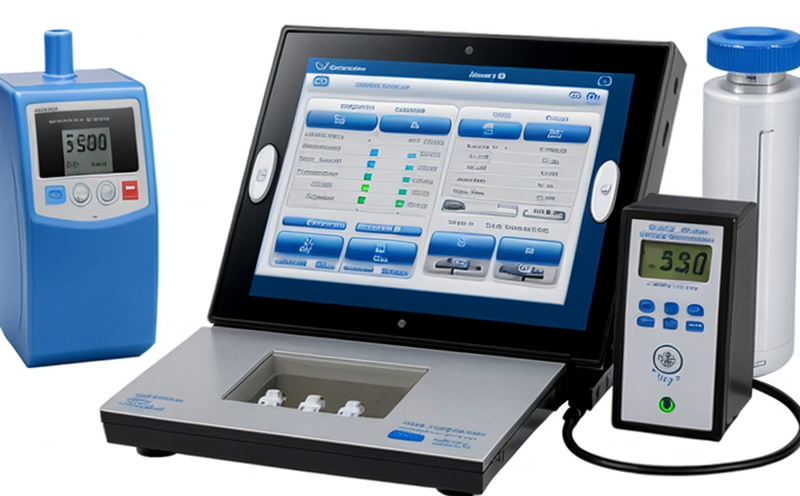ISO 80369-7 Connector Stress Cracking Resistance Testing
The ISO 80369-7 standard is pivotal in ensuring the safety and reliability of connectors used in medical devices, particularly those involved in infusion pumps and drug delivery systems. This standard focuses on minimizing the risk of stress cracking, which can lead to catastrophic failures that endanger patient health.
Stress cracking in connectors can occur due to various factors including cyclic loading, temperature changes, and the presence of corrosive substances. The ISO 80369-7 test specifically evaluates the connector's resistance to such stress cracking under defined conditions. This is crucial for medical devices where any failure could have severe consequences.
The testing procedure outlined in this standard involves subjecting the connectors to cyclic mechanical loading and exposure to a corrosive environment. The goal is to simulate real-world usage conditions that might lead to stress cracking. By identifying weak points or design flaws early in the development process, manufacturers can improve product reliability and patient safety.
The test setup typically includes fixtures capable of applying controlled cyclic loads to the connector while it is immersed in a corrosive solution. The duration of exposure and loading cycles are carefully specified in the standard to ensure consistency with real-world scenarios. After exposure, the connectors undergo inspection for cracks or other signs of failure. Failure modes may include visible cracks on the surface, reduced mechanical strength, or loss of integrity.
The importance of this testing cannot be overstated, especially given the sensitive nature of medical devices and the critical role they play in patient care. By adhering to ISO 80369-7, manufacturers can ensure that their connectors meet the highest safety standards, thereby protecting patients from potential harm.
Real-world application examples include the use of these connectors in infusion pumps for delivering chemotherapy drugs or insulin pumps for diabetic patients. Any failure in these systems could lead to serious medical emergencies if not properly designed and tested. Therefore, compliance with ISO 80369-7 is essential for ensuring that medical devices are safe and effective.
In summary, the ISO 80369-7 Connector Stress Cracking Resistance Testing is a critical step in the development of reliable medical devices. By following this standard, manufacturers can significantly reduce the risk of stress cracking failures, thereby enhancing patient safety and device performance.
Applied Standards
The ISO 80369-7 standard is widely recognized for its stringent requirements in evaluating connectors used in medical devices. This international standard ensures that connectors are capable of withstanding the rigors of real-world use, particularly in environments where stress cracking could lead to catastrophic failures.
Key aspects of this standard include:
- Cyclic Loading: The connector is subjected to repeated mechanical loading cycles designed to mimic actual usage conditions.
- Corrosive Exposure: Connectors are exposed to corrosive environments to simulate the effects of moisture, saline solutions, and other potential contaminants.
- Inspection Procedures: After exposure, connectors undergo detailed inspection for signs of stress cracking or other failures.
The standard provides comprehensive guidance on specimen preparation, test setup, and data analysis. It ensures that testing is standardized across different manufacturers, promoting consistency in quality and reliability.
Adherence to ISO 80369-7 not only meets regulatory requirements but also enhances the reputation of medical device manufacturers by demonstrating a commitment to safety and excellence in product design.
Scope and Methodology
The scope of ISO 80369-7 Connector Stress Cracking Resistance Testing is primarily focused on connectors used in infusion pumps, drug delivery systems, and other medical devices where stress cracking could lead to severe consequences. This testing ensures that the connectors can withstand cyclic mechanical loading and corrosive environments without failure.
The methodology involves a series of controlled experiments designed to simulate real-world conditions. The process begins with specimen preparation, ensuring that the connectors are in their intended operating state before testing. Specimens are then subjected to cyclic loading using specialized fixtures capable of applying precise forces. Simultaneously, they are exposed to corrosive environments such as saline solutions or humidity chambers.
During exposure, the connectors undergo continuous monitoring to detect any signs of stress cracking. This is typically done through visual inspection and other non-destructive testing methods. After the prescribed cycles, the specimens are thoroughly inspected for cracks, changes in mechanical properties, or loss of integrity. Any failure modes observed are meticulously recorded and analyzed.
The results of these tests provide valuable insights into the connector's performance under stress cracking conditions. This information is crucial for manufacturers to identify potential weaknesses in design and improve product reliability. By following this standardized methodology, medical device manufacturers can ensure that their connectors meet the highest safety standards.
Environmental and Sustainability Contributions
The ISO 80369-7 Connector Stress Cracking Resistance Testing contributes significantly to environmental sustainability by promoting the development of reliable and durable medical devices. Reliable connectors are less likely to fail prematurely, reducing the need for frequent replacements or repairs.
This not only extends the operational life of medical devices but also minimizes waste generation. By ensuring that connectors can withstand harsh conditions without failure, manufacturers contribute to a more sustainable healthcare industry.
The testing process itself is designed with environmental considerations in mind. The use of recycled materials and energy-efficient test equipment helps reduce the carbon footprint associated with product development. Additionally, by identifying design flaws early in the development stage, manufacturers can minimize material waste during production runs.
Moreover, reliable connectors enhance patient safety, which is a key objective of sustainable healthcare practices. By reducing the risk of medical errors and adverse events, these connectors contribute to improved health outcomes and resource efficiency.
In summary, ISO 80369-7 Connector Stress Cracking Resistance Testing plays a vital role in promoting environmental sustainability by ensuring reliable and durable medical devices that minimize waste and enhance patient safety.





